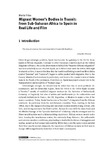Migrant Women’s Bodies in Transit: From Sub-Saharan Africa to Spain in Real Life and Film

Use este enlace para citar
http://hdl.handle.net/2183/25698
A non ser que se indique outra cousa, a licenza do ítem descríbese como Atribución-NoComercial-SinDerivadas 3.0
Coleccións
- Investigación (FFIL) [877]
Metadatos
Mostrar o rexistro completo do ítemTítulo
Migrant Women’s Bodies in Transit: From Sub-Saharan Africa to Spain in Real Life and FilmAutor(es)
Data
2019Cita bibliográfica
Frías Rudolphi, María. Migrant Women’s Bodies in Transit: From Sub-Saharan Africa to Spain in Real Life and Film. In Luczak, Ewa Barbara; Anna Pochmara and Samir Dayal: New Cosmopolitanisms, Race, and Ethnicity Cultural Perspectives. De Gryter, 2019. pp. 162-191
Resumo
[Abstracts] The purpose of this chapter is to focus on African women’s bodies in transit from West Africa to Spain, in view of Gerardo Olivares’s42 pioneer film on the topic, 14 Kilometros (2007). Although the protagonist Violet’s journey does not speak for all African migrant women’s passage to Spain, it is my intention to highlight and analyze certain experiences that female migrant subjects share—even before the actual journey starts—as well as to address specific gender-oriented issues, such as prostitution
or sex trafficking, that assault them throughout the duration of their excruciatingly painful voluntary or forced self-exile. In this sense, I would maintain that for the African women in transit, whether real or fictional, the journey of migration to Spain is written on their bodies. Finally, throughout the chapter I comment on and establish a parallel between the transatlantic slave trade and contemporary human trafficking and migration subjects.
Palabras chave
African women
Migration
Displacement
Olivares, Gerardo
Gender studies
Race
Migration
Displacement
Olivares, Gerardo
Gender studies
Race
Versión do editor
Dereitos
Atribución-NoComercial-SinDerivadas 3.0
ISBN
978-3-11-062651-3






